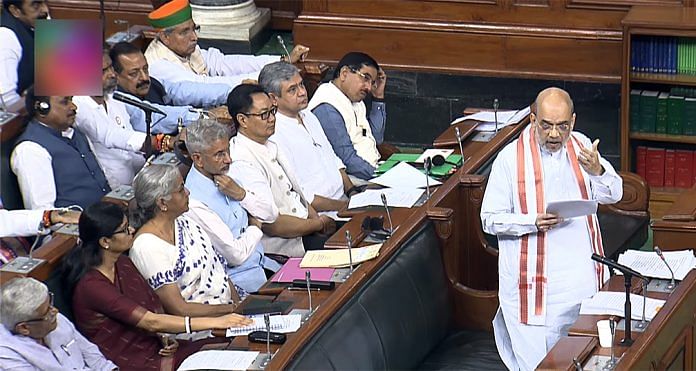New Delhi: The Modi government Friday introduced three Bills in the Lok Sabha to replace the colonial-era criminal laws, with Union Home Minister Amit Shah saying that the proposed legislations will bring about a “transformative change” in the Indian judicial system by prioritising the delivery of justice over punishment.
Shah said the Indian Penal Code (IPC), 1860, Criminal Procedure Code (CrPC), 1898, and the Indian Evidence Act, 1872, will be replaced by the Bharatiya Nyaya Sanhita (BNS) Bill, 2023, Bharatiya Nagarik Suraksha Sanhita (BNSS) Bill, 2023, and Bharatiya Sakshya (BS) Bill, 2023, respectively, once these are cleared by the Parliament.
For now, the bills have been sent to the Parliamentary Standing Committee on Home Affairs for detailed scrutiny.
Among the major highlights of the BNS Bill is the scrapping of Section 124A, which deals with sedition, along with the addition of a new section to prescribe punishments for secession, armed rebellion, subversive activities, separatist activities, or activities that endanger the sovereignty, or unity and integrity of India.
The bill also says that punishment for mob lynching can go up to the death penalty, a move that Shah said has been taken after closely studying such crimes.
In total, 313 changes have been proposed in the three criminal laws, he said, adding that the objective is to ensure that people who approach the courts get justice within three years.
“The laws that are being replaced were essentially aimed at safeguarding the continuation of the British administration and their objective was to punish, not deliver justice,” Shah said.
“The new laws will safeguard constitutional rights and deliver justice. These laws will be imbibed with the Indian soul,” he added as the treasury benches thumped their desks. The Opposition had staged a walkout.
Also Read: ‘Think about Delhi, not INDIA,’ Amit Shah slams Oppn veto to Bill over control of officers
How the laws will change
Shah said the BNSS Bill, which seeks to replace the CrPC, has 533 sections — nine sections added, 160 sections changed, nine annulled.
The BNS Bill has 356 sections, following changes in 175 IPC sections, addition of eight and annulling of 22.
The BS Bill, or the proposed new evidence law, has 170 sections, with 23 changes, one addition and five annulments proposed.
“All these laws were replete with signs of slavery. The British Parliament had passed them and we had adopted it. They have references on the UK Parliament, London Gazette, privy council, the British Crown. There are 475 such references,” Shah said.
Under the BNS Bill, fugitives who have escaped to foreign shores will face trial in their absence and be punished too, Shah said, naming Dawood Ibrahim to make his point. Digital trails in server logs, smartphones, SMS, computers will also be considered “legal documents” under the proposed law, he added.
The proposed law also seeks to make videography compulsory during search and seizure. Shah said that this, along with an emphasis on forensic evidence, was necessitated by the fact that the rate of conviction in India continues to be “very low”, and that the goal was to achieve a conviction rate of 90 percent.
The bill seeks to make the visit of forensic teams mandatory in the case of offences that attract a jail term of over seven years. It also seeks to make it mandatory to record the statement of victims of sexual violence in videographic mode.
“We have decided that chargesheets will have to be filed within 90 days and courts can be given extension for another 90 days. The courts cannot take more than 60 days to frame charges and after the completion of hearings, courts will have to deliver a verdict within 30 days,” Shah said. “The judgments will have to be uploaded online within seven days.”
The remission policy of convicts will also undergo changes once the BNS Bill is approved, Shah said, referring to the “premature release in Bihar”, alluding to ‘bahubali’ former MP Anand Mohan.
The sentence of those serving the death penalty can be reduced to life imprisonment, life imprisonment can be reduced to seven years, and seven-year imprisonment can be reduced to three years after remission, he said. “Political reasons cannot dictate their release,” he added.
(Edited by Sunanda Ranjan)
Also Read: Amit Shah questions why video of 2 abused Manipuri women surfaced before Parliament session



